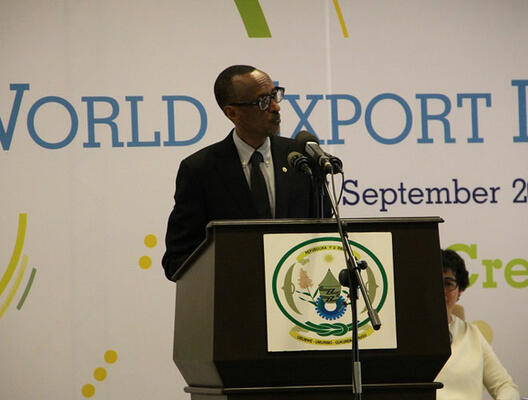
Speech by President Paul Kagame at the World Export Development Forum (en)
Delivered on 16 September 2014 at the opening session World Export Development Forum
(CHECK AGAINST DELIVERY)
It is my pleasure to welcome you all to Rwanda for this World Export Development Forum and I am very happy to join you.
I would like to thank the International Trade Centre for your partnership with the Rwanda Development Board in organising this event.
This gathering is about one of the hardest challenges in the international development agenda: How to raise global development by bringing the benefits of trade to least developed countries, particularly landlocked, like Rwanda, and small island states, where most businesses are SMEs.
I prefer to leave the detailed discussion of trade facilitation mechanisms to you, the experts who will be handling this.
Instead, I would like to open this meeting with a few words about the mindset required to transform an economy.
For those of us living in the ITC’s focus countries, the first obstacle to overcome, is the belief that we cannot do it. If we overcome this, the rest is history.
Our path to prosperity may be harder and slower than it was for others, but there is no country that is so isolated and disadvantaged that it cannot find some competitive edge in the global economy.
So the first piece of the necessary mindset is to believe in ourselves.
However, to find the right trade niche requires not only hard work, but also resilience in the face of setbacks and disappointments. If the path were easy or obvious, it would have been discovered already.
Therefore, the second mindset trait is, to never give up.
Export development is really about embracing competition.
How do we ensure that we are prepared to put ourselves out there globally and swim with the best?
How do we equip local entrepreneurs and businesses to take advantage of the many opportunities to get better and stronger?
To overcome geographical and other disadvantages, we must benchmark ourselves against the best in the world, not just against similar economies.
For example, if you are winning all your tennis matches, you are probably not improving your game very much. You may think you are winning, even though, in a larger sense, you are really losing.
The same principle applies as we seek to develop the productive capacities of our citizens, and our economies as a whole.
So the third mindset element is, to see competition as an opportunity rather than a problem.
Our role as governments and facilitators is to ask what can be done to help our businesspeople and workers learn the lessons of competition faster, so that the rewards can be shared without delay.
The foundation of all our efforts is good governance, which for us means a relentless focus on delivering the results that citizens want. As recorded in many opinion surveys, the top priority for people, in almost every country, is jobs.
Building a competitive, modern economy requires smart investments in human capital, and productive knowledge.
After all, real wealth is in the head, not in the ground.
This ranges from providing high-quality skills training and broadband connectivity, to nurturing a culture of innovation and entrepreneurship.
We are much stronger together, so in eastern Africa, we are working to build regional trade by integrating our markets.
We have removed non-tariff trade barriers, as well as restrictions to travel and work. Through the Northern Corridor Integration Projects, we are also taking a regional approach to critical infrastructure and fast-tracking these steps we need to take.
But, in order for such efforts to transform societies, we need to start with a conversation about the attitudes required to find solutions and get things done. There is enough opportunity in this world for all of us generally, and there is enough opportunity in East Africa and the rest of the continent.
I welcome you again to Rwanda, and wish you a happy stay and fruitful deliberations.
Thank you.



